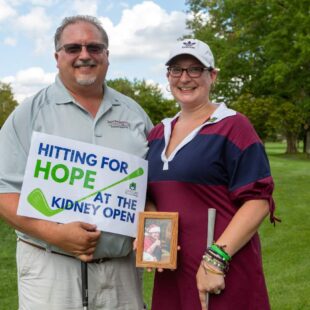Emotional Well-being
Many caregivers end up neglecting their own needs while caring for the needs of a transplant patient.
Stress
Caregiver Emotional Health Checklist
- Do you feel your life is worth living? (If you answered ‘No’ to this question, please seek help immediately by calling 911 or going to your local hospital emergency room (ER))
- Do you receive at least between six and nine hours of sleep regularly?
- Do you feel your weight has been stable in the last three months (no major weight gain or loss)?
- Do you generally find pleasure in doing daily activities and hobbies?
- Do you feel you have adequate energy to perform your daily activities?
- Have you felt happy and satisfied with your life over the past six weeks?
- Do you talk with or visit friends/relatives regularly?
- Do you feel calm and peaceful regularly?
- Do you feel your life is free of harmful stress?
If you answered ‘No’ to some or all of these questions, it may be helpful to speak with your support system. This can include family and friends or your transplant support team at the hospital, such as your doctor, coordinator, and social worker. If you are a caregiver, please consider joining our online caregiver support group to connect to others who are going through similar issues.
Anxiety and Depression
Before attempting to identify yourself with anxiety or depression, it is necessary to understand what Generalized Anxiety Disorder and Clinical Depression are and how it differs from being anxious, stressed out, sad, or overwhelmed.
Anxiety
If you have Generalized Anxiety Disorder, it will be hard to control your worry as well as cause interruptions in at least one area of your life – such as at work and in a social setting. You will experience at least three of the following symptoms, which have been present during the same six month period.
- Restlessness, feeling keyed up, or on edge
- Being easily fatigued
- Difficulty concentrating
- Irritability
- Muscle tension
- Sleep problems
Depression
If you have major depressive disorder, you will experience at least five or more of the following symptoms, which have been present during the same two week period, and at least one of the symptoms is a depressed mood or loss of interest or pleasure.
- Depressed mood most of the day, nearly every day, as suggested by yourself or others
- Visibly lessened interest or pleasure in almost all activities most of the day, nearly every day
- Large weight loss when not dieting or weight gain or decreased or increased appetite nearly every day
- Inability to get enough sleep or you sleep for excessive hours at a time nearly every day
- Psychomotor agitation (a series of unintentional and purposeless motions) or psychomotor retardation (slowing down of thought and a reduction of physical movements) nearly every day
- Fatigue or loss of energy nearly every day
- Feelings of worthlessness or excessive or inappropriate guilt nearly every day
- Diminished ability to think or concentrate, or indecisiveness, nearly every day
- Recurrent thoughts of death or suicidal ideation
Major Depressive Disorder will cause significant impairment in social, occupational and other important areas of functioning.
It is not uncommon for someone to feel sad or anxious during the transplant process since it can be unpredictable and worrisome. As a transplant caregiver, you may feel many of the symptoms of depression and/or anxiety, but may not have either.
Your feelings are valid and you deserve to be happy, whether you meet the qualifications or not. It is always important to talk to your doctor about your feelings so they can discuss some options to feel better. Just because you are not classified as having depression or anxiety does not mean it may not be helpful to talk to a counselor.
Sometimes just being able to get your feelings out can be very helpful, and a counselor will not judge you or give you advice. Also, try to do fun things every day, even if only for an hour. It is important to remember why you enjoy life.
If your feelings of sadness or anxiety are not going away then take your treatment a step further: meet with a counselor regularly, discuss medication options with your doctor, or change your lifestyle and incorporate healthy habits into your life, like exercise and good nutrition. Feelings of sadness, being overwhelmed or fatigue should not be ignored, and if ignored they could turn into major depressive disorder or cause other physical/medical issues. For instance, fatigue may be normal of caregivers, but it should not go untreated.
If you or a loved one ever has any thoughts of suicide, call 911 or go to your local hospital emergency room (ER) immediately for help.
Treatment
Counseling and Support Groups
Counseling and support groups can be very beneficial to many people. They allow the ability to talk to a person without judgement and work out issues in their lives that they are having trouble coping with on their own. For instance, a counselor or therapist may be able to assist a person in identifying coping skills that they never realized they had.
Counselors or therapists typically do not give advice, but can assist people in seeing things they may not have seen on their own. Sometimes people just need to talk to someone who will not judge them or give advice, which many times friends and family members do.
There are many different ways to find an appropriate counselor or therapist. Many private insurances cover behavioral health, such as counseling, mental health, and drug and alcohol treatment. You can contact your health insurance customer service department and ask to speak with someone about behavioral health benefits. Many companies and employers also now provide employees with “employee assistance programs” which can give discounts for counseling.
Many support groups are free and insurance is not required. It may be difficult to locate an in-person transplant caregiver support group, but there are general caregiver support groups out there that can be just as helpful. Also, many hospitals provide transplant support groups that you and the patient could attend together. For more information on support groups, please visit Support Groups and Additional Resources.
If you cannot afford to see a private counselor, and your insurance will not provide assistance, many counties and cities have a wide variety of social service agencies that may provide support. Speak to your transplant social worker for some suggestions, or contact your local city or county office for a list of social service agencies in your area.
Sometimes the toughest thing is asking for help, but there are many people out there who want to help and can provide the support you are searching for.
Anti-Depressants
Antidepressants are another way to treat depression. An anti-depressant medication is a prescription medication to physiologically address depression by regulating serotonin, norepinephrine, or dopamine levels in the brain. Different antidepressants address different chemicals in the brain. Though they all work to address your mood, it is important to talk with your doctor about your symptoms so they can refer you to a psychiatrist or prescribe you the right medication.
Many people are reluctant to try antidepressants because they do not want to feel “high,” become addicted, or deal with the side effects many medications have.
Antidepressants are not tranquilizers, so people do not tend to feel a “high” when taking them, as long as they are taken as prescribed. When taken as prescribed, addiction to antidepressants is not typical. Though antidepressants may have side effects, just as most medications do, government research through the Agency for Healthcare Research and Quality found people typically only experience one side-effect when taking antidepressants. Again, it is important that your doctor be informed of any side-effects or unwanted feelings while taking antidepressants because medications work differently in all people.
Your doctor can instruct you on the appropriate medication and dose, though different ones may need to be tried before finding the right one for you. The Agency for Healthcare Research and Quality also found that 6 out of 10 individuals feel better with the first antidepressant they try, whereas the other people tend to need to try different antidepressants before finding the right one for them.
How will you know if your antidepressant is working? The symptoms that you previously had due to depression will begin to improve. For instance, you may begin to sleep better, become more engaged in your life and have increased interest in your previous hobbies, or your weight may begin to regulate and your eating habits improve. Improvement can take some time; many people feel better after about 6 weeks of taking antidepressants, but it could take longer. If you feel it is taking too long, talk to your doctor so changes to your dosage or medication can be made, if needed. Many people also need to continue to take these medications for at least 6-9 months.
Antidepressants are an effective way to treat depression. It is important to remember to take the medication exactly how the doctor prescribes and if you are unhappy with the medication, do not stop taking it abruptly. Always talk to your doctor before making any changes and allow your doctor to assist in leading you in the best direction to better health and happiness.
For more information on mental and emotional health, here is a guide through helpguide.org





